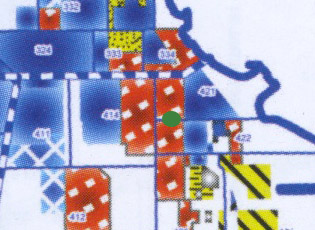The Sun-Times's Frank Main has more on last night's mass shooting at 79th and Essex, and the theories of the cause:
That area of the South Shore neighborhood is mostly controlled by the Black P Stones gang. Police said they were continuing to sort out whether the shooting involved a beef between the Black P Stones and the Gangster Disciples — or whether it was between Black P Stones factions.
For context, here's about where the shooting took place on the 2011 gang territorial boundaries map; red-and-white is Black P Stones, solid blue is Gangster Disciples:

These are both very old gangs; the Black P Stones date back to 1959, when they were the Blackstones, then the Blackstone Rangers, and then the Black P Stones. Jeff Fort, the man who became the gang's leader and was later the first American prosecuted for terrorism, went to elementary school about three miles north of 79th and Essex—bordering on what was still, in 2011, Black P Stones territory. (The Gangster Disciples go back to the early 1960s.)
From 1959 to 1962, James F. Short, Jr., a Sangamon County native and one of the many sociologists to study gangs at the University of Chicago, conducted a study of local gangs with longtime U. of C. prof Fred Strodtbeck. So he was there, literally, at the birth of some of the gangs we're still dealing with today. A couple years ago, he narrated a slideshow of his work:
But he and his researchers just missed the Black P Stones:
Chicago police attention at the time was focused primarily on trouble-making street gangs that posed threats to local communities and to themselves in the form of gang conflict. Although we did not make systematic inquiries about the matter, it was clear that some gangs recognized that public notoriety was a factor in their reputations. Very early in our research the detached worker program director received a telephone call from a boy who identified himself as a member of a south side gang. The boy requested that a “worker” be assigned to his gang. Asked why, after a pause the boy responded, “Man, you ain’t nothin’ unless you got a worker.” Regrettably the program did not follow through on this request from the gang that became the Blackstone Rangers, later reputed to be the toughest, best-organized gang in Chicago.


